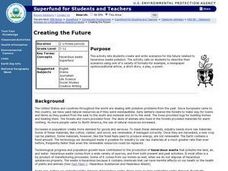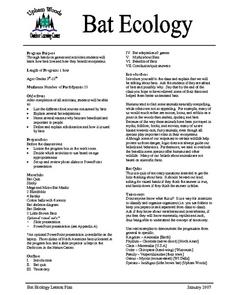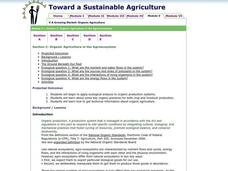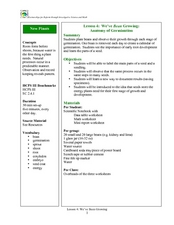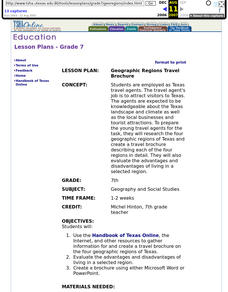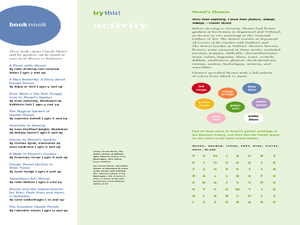Curated OER
Early Settlements
Students embark on a journey through colonial times. For this early settlement lesson, students come to understand what life was like for the settlers in the early colonies. Students research and create projects illustrating their new...
Curated OER
Creating the Future
Students work together to develop and write scenerios for the future of hazardous waste cleanup. They share their scenerios with the class. They complete activities as well.
Curated OER
Bat Ecology
Young scholars, through hands on games and activities, discover how bats live and how bats benefit ecosystems. They play a game designed to show them how echolocation works and another to show how mother bats locate their young through...
Curated OER
Lesson 3: Nutrition, Labeling and Packaging
Students explore basic nutrition concepts to help them select healthy diet, evaluate food intake, discuss major food labeling issues, design labels for food products, examine history of food packaging development and how packaging...
Curated OER
Toward a Sustainable Agriculture
Students analyze organic production systems. In this organic agriculture lesson, students examine key organic practices for both crop and livestock. This lesson includes 5 different activities, 4 critical thinking questions and...
Curated OER
Hunters and Gatherers
Sixth graders participate in mapping and other activities to understand why ancient civilizations developed as they did. In this ancient civilization lesson, 6th graders recognize that there were three important climate zones and...
Curated OER
Gettysburg Rocks Recycle to Win
Eighth graders use a geologic cross section to study the rock cycle of the Gettysburg battlefield. In this rock cycle lesson, 8th graders connect the rock cycle and continental rifting.
Curated OER
3rd grade social studies
In this social studies worksheet, 3rd graders complete multiple choice questions about Native Americans, sequencing history, geography, and more. Students complete 20 questions.
Curated OER
Insect Homes
Students investigate student homes. In this insect homes lesson plan,students observe insect homes. Students visit a campsite and gather information about insect homes. Students examine and record an insect home on a worksheet....
Curated OER
We’ve Bean Growing: Anatomy of Germination
Students identify the main parts of a seed. In this biology lesson, students explain the factors needed for the seed to grow. They record observations everyday and report findings to class.
Curated OER
Geographic Regions Travel Brochure
Seventh graders research the four geographic regions of Texas and create a travel brochure describing each of the four regions in detail. They also evaluate the advantages and disadvantages of living in a selected region.
Curated OER
Population Growth
Students grow duckweed, observe what happens when an organism population is allowed to grow without predation or competition, view videos about invasive species, and develop a proposal for controlling the growth of an invasive species in...
Curated OER
Regions of the United States
Fifth graders collect data about regions of the United States using the Internet, library books, and encyclopedias. They write an essay persuading people to visit their state.
Curated OER
Stewardship of Yosemite National Park
Students devise a plan that would be true to John Muir's spirit of stewardship toward Yosemite. They analyze a core map to determine the original plan and usage of the park and compare the original plan to a current park map.
Curated OER
Growing Barley for Use in Biosynthesis Experiments
Students attempt to determine the optimum growing conditions for barley. They assess the effects of a number of substances such as ammonium chloride and urea on the plants
Curated OER
Acid Rain
Students investigate acid rain. In this environmental lesson, students participate in an experiment using litmus paper and various liquids and then test the acidity of the liquids. Students identify reasons why acid is harmful to the...
Curated OER
Corn: An A-maizing Plant
Students explore the corn crop. In this farming instructional activity, students identify which states are in the corn belt and read about the history of corn, its uses and its development and growth. Students dissect a corn kernel....
Curated OER
Wolves
Students explore wolves. In this ecology and wolves lesson, students research predator-prey relationships on the Internet and complete a related worksheet with a partner. Students interpret data on bar graphs to determine growth and...
Curated OER
NGA Kids Inside Scoop Spring 2007
Students become familiar with the work of Claude Monet and his garden paintings. In this Monet lesson, students compare the garden works of Claude Monet. Students examine pictures for the colors in his paintings. Students complete a...
Curated OER
Web of Life Game: Trout
Students explore the concept of food webs. In this food web lesson, students demonstarte the connection between species. Students use a ball of string show how the food web works, then have a class discussion.
Curated OER
Classification of Cerealites
Students create a dichotomous key. In this categorizing lesson, students create a dichotomous key for different types of cereal. Students classify the cereal into groups such as flakes and cereal with holes. Students discuss their...
Curated OER
Making Paper
Students explore paper making. In this cross curriculum multicultural ecology and art lesson, students follow written and oral instructions to make paper using common household items. Students predict the amount of paper use in their...
Curated OER
Insect Conservation
Students make a diorama. In this insect lesson plan, students review what they know and what they need to know about insects. Students define conservation, discuss why it is important to conserve insects, and make an insect diorama.
Curated OER
What Does it Take to be a Survivor? Part One
Young scholars explore marine animal adaptation. In this introductory ocean life biology instructional activity, students access prior knowledge by participating in a whole class "thought swap." Young scholars form two lines, respond to...



